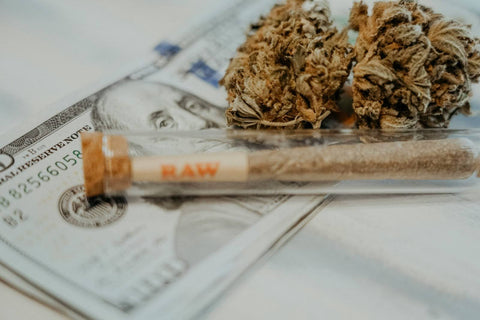
Pre-employment drug testing has long been a common step in the hiring process for many companies. However, with the rapid changes in marijuana legalization, what once seemed straightforward has become much more complex.
As of 2023, over 20 states have legalized marijuana for medical use, with several also approving it for recreational use. Despite this, marijuana remains illegal under federal law, creating a confusing mix of state laws and employment protections that employees must navigate.
In this comprehensive guide, we'll explore the current state of marijuana legalization, the implications of pre-employment marijuana testing for job seekers, the limitations of current testing methods, evolving attitudes towards testing, legal considerations for employees, and emerging alternative approaches to marijuana testing.
Table of content:
- Pre-Employment Marijuana Testing: Balancing Safety, Legality, and Fairness
- The Rationale Behind Pre-Employment Marijuana Testing
- Limitations of Current Testing Methods
- Changing Employer Attitudes
- Legal Issues for Employees
- New Approaches to Testing
- Adapting Pre-Employment Marijuana Testing to New Laws and Worker Rights
- Frequently Asked Questions (FAQs)
Looking where to buy the best at home drug test? Look no further. Get yours on Amazon today!
Pre-Employment Marijuana Testing: Balancing Safety, Legality, and Fairness
The rules around marijuana have changed a lot lately. More states are letting people use it for health or fun, which means workers face a mix of rules about using it and keeping their jobs.
This mix of rules makes things hard, especially for those who work in different states. What's okay in one place might get you in trouble in another. This can make it tough to know how to stay within the rules.
Further complicating matters, some states have enacted laws that shield employees from discrimination based on their off-duty marijuana use. These protections add another layer of complexity for employers seeking to enforce drug-free workplace policies.
With all these changes, workplaces need to find a way to keep everyone safe and respect workers' rights. They're taking a closer look at when and why they test for marijuana. Now, Instead of testing all new hires, some companies test only if they suspect an employee is under the influence while on the job. This way, they aim to keep things safe without stepping too much into what workers do in their own time.
The Rationale Behind Pre-Employment Marijuana Testing

Even as laws around marijuana use change, many workers find that they still have to pass drug tests before getting hired. Here's why this is still common:
- Maintaining a drug-free workplace: Workers understand that for everyone to stay safe and get work done, it's important not to be under the influence at work.
- Staying safe at work: In jobs where safety is a big deal, like driving, building, or health care, passing a drug test can be a must to help stop accidents or harm.
- Following the rules: Some workers need to pass these tests to work on projects that get money from the government or follow other official rules.
- Matching work culture: Sometimes, a job might not want workers to use marijuana, even when they're not working, because of the image the company wants to keep.
- Legal and insurance reasons: Workpaces might also test to keep insurance costs low or meet their insurance terms. This helps them cut down on legal troubles and insurance bills.
Limitations of Current Testing Methods
While pre-employment marijuana testing remains prevalent, the current testing methods have significant limitations.
The most common marijuana tests (urine and hair) can show if you used marijuana in the past. But they can't tell if you're high right now. This means you could test positive even if you used marijuana days or weeks ago and aren't impaired at work.
As Dr Matthew Nuesse explains in the video below, a urine test will typically detect marijuana in your system for 30 days after you stop using. For hair tests, marijuana can be detectable for up to three months. These lengthy detection periods can be problematic for occasional or off-duty users to pass their tests, even if their usage does not impact their work performance.
These tests can yield false positives from legal CBD products, which contain trace amounts of THC. This further complicates the interpretation of test results and raises questions about the fairness and effectiveness of pre-employment marijuana testing.
This issue also brings up the concern of personal privacy. Since these tests can pick up usage from weeks ago, they don't just reflect on an individual's ability to do their job safely. It means that private choices made during one's own time, which don't impact their work, can affect job opportunities. This raises questions about where to draw the line between ensuring a safe work environment and respecting personal freedom
Changing Employer Attitudes
Recognizing these limitations and the evolving legal landscape, some employers are reevaluating their approach to pre-employment marijuana testing.
In light of labor shortages and the growing social acceptance of marijuana use, a growing number of employers are dropping marijuana from their pre-employment screening panels altogether. Instead, they are shifting their focus to reasonable suspicion and post-accident testing, which are more directly tied to on-the-job impairment.
This shift reflects a growing acknowledgement that blanket pre-employment marijuana testing may unnecessarily exclude otherwise qualified candidates and expose employers to legal risks in states with employee protections for off-duty marijuana use.
Legal Issues for Employees
The legal scene around pre-employment marijuana testing is something workers need to think about carefully.
Workers should know their rights under state laws that protect their off-work use of marijuana, especially when applying for jobs that might not be safety-sensitive. It's important to understand how different companies' drug testing rules might affect you, based on your location or job.
Making sure you're treated the same as other job seekers is key. This means knowing how these drug tests are done and what your rights are if you use marijuana for health reasons, as the Americans with Disabilities Act (ADA) might offer some protection.
It's about staying informed and ready to talk about your situation with potential employers, understanding both your rights and the legal lines companies need to walk.
New Approaches to Testing

As the usual tests for marijuana use come under question, some places of work are trying out new ways to ensure tests are fair and truly useful.
One fresh method is using tests that check if someone is fit to do their job at the moment, rather than if they've used marijuana in the past. These tests could look at how well someone thinks or moves, offering a clearer sign of whether they can do their job safely.
Tests that use saliva to find recent use of marijuana are also getting more attention. These tests can't say if someone is impaired now, but they can spot usage much closer to the test time than urine or hair tests can.
Some places are also moving away from strict testing toward helping workers who might have issues with drug use. By setting up programs to help employees and making a workplace where everyone feels they can speak up, employers aim to tackle drug use problems in a supportive way, making for a happier and more efficient workplace.
Adapting Pre-Employment Marijuana Testing to New Laws and Worker Rights
As the rules and views on marijuana keep changing, employees need to understand how these shifts affect their rights around pre-employment drug tests. It's crucial to know the laws in your area and how they protect you at work.
The main thing is to get familiar with clear, lawful drug testing rules that your workplace should follow. These rules need to be fair and updated often to match new laws and social views. Getting advice from legal experts or looking up recent law changes can help you stay in the know.
It's important for you to ask for a fair and detailed approach from your workplace regarding drug testing. This could mean they consider each situation separately and do tests based on actual work concerns rather than just testing everyone before they're hired.
As more states make marijuana legal, workplaces need to be open to changing their testing methods. They should talk clearly with their teams and make sure everyone knows that their rights and safety are a top priority. This way, workplaces can make rules that fit everyone's needs.
During these changing times, workers need to talk to their employers about drug testing policies. A workplace that encourages open discussions can help reduce worry and build trust. This shows that your employers care about following the law and your well-being.
As marijuana becomes legal in more places, you must watch how your workplace updates its testing policies. They should be ready to make changes and ensure everyone feels secure and valued. Taking these steps makes sure the workplace stays productive and fair, serving as a great example for all.
Want more in-depth help to ace your pre-employment marijuana test? Check out the "THC Test Masterclass" course by Dr. Matthew Nuesse. In just 40 minutes, you'll learn everything from how tests work to proven tips to boost your odds of passing.
Frequently Asked Questions (FAQs)
What drugs are included in a standard 5-panel pre-employment drug test?
A standard 5-panel drug test, also known as the SAMHSA 5, typically screens for the following substances:
- Marijuana (THC)
- Cocaine
- Amphetamines (including methamphetamine, MDMA, and MDA)
- Opiates (codeine, morphine, heroin)
- Phencyclidine (PCP)
What additional substances may be included in an expanded drug panel?
Some employers may choose to test for additional substances beyond the standard 5-panel. These can include:
- Barbiturates
- Benzodiazepines
- Ethanol (alcohol)
- Hydrocodone
- Methadone
- Methaqualone
- Propoxyphene
Are all pre-employment drug tests required to follow SAMHSA guidelines?
No, not all pre-employment drug tests must adhere to SAMHSA guidelines. Federal agencies and federally regulated industries, such as the Department of Transportation (DOT), are required to follow SAMHSA standards for drug testing. However, private sector employers who are not federally regulated may choose to use SAMHSA-certified laboratories and procedures, but it is not mandatory.
Is marijuana legal in all states?
No, marijuana is not legal in all states. While some states have made marijuana legal for medical and/or fun use, it stays illegal under the law for the whole country. This leads to a mix of state laws about marijuana use and job rights.
Why do workplaces test for marijuana before hiring?
Workplaces test for marijuana before hiring to keep a workplace without drugs, to ensure safety (mainly in jobs where being alert is key), and to follow federal rules and deals.
What can I do if I'm fired for marijuana use outside of work?
In some states, some laws protect you if you use marijuana outside of work hours. It's wise to know your state's rules. If you're let go, you might want to talk to a legal expert to see if your rights were ignored.
References:
- https://www.nolo.com/legal-encyclopedia/state-laws-on-off-duty-marijuana-use.html
- https://www.nolo.com/legal-encyclopedia/drug-tests-job-applicants-if-33051.html
- https://www.washingtonpost.com/technology/2023/07/17/marijuana-drug-test-weed-work/
- https://www.shrm.org/topics-tools/employment-law-compliance/workplace-drug-testing-can-employers-still-screen-marijuana
- https://blogs.cdc.gov/niosh-science-blog/2020/06/15/cannabis-and-work/
- https://www.confirmbiosciences.com/knowledge/terminology/samhsa-5/
- https://www.thermofisher.com/in/en/home/clinical/diagnostic-testing/clinical-chemistry-drug-toxicology-testing/drugs-abuse-testing/drug-testing-overview/samhsa.html
